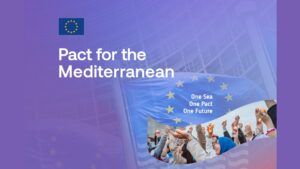As Europe prepares for the next research and innovation funding cycle, Framework Programme 10 (FP10), a newly published survey commissioned by the EU has revealed a concerning gap: young people across Europe do not view research and innovation (R&I) as a top priority for the European Union.
The EU Youth Survey, published by the European Commission, collected responses from over 2,000 young people aged 15 to 30. When asked to rank their top policy priorities for the EU, just 8% of respondents chose research and innovation—a strikingly low number given the EU’s longstanding ambition to lead globally in science and technological development.
The first graph featured in the article (created by Science Business based on the survey data) illustrates this trend vividly: issues such as climate change (36%), education (34%), and health (32%) dominate youth concerns, while research and innovation trails behind.

The second graph breaks the results down by country, exposing variations across member states but confirming the overall picture: R&I is consistently a low priority among young respondents.

This presents a significant communications and policy challenge as the EU develops FP10, the successor to the €95.5 billion Horizon Europe programme. FP10 is expected to launch in 2028 and will play a central role in shaping Europe’s economic and technological future. Yet concerns are growing among higher education and research leaders about the visibility and political backing of such programmes.
Kurt Deketelaere, Secretary-General of the League of European Research Universities (LERU), has warned that the European Commission has so far remained largely silent on FP10 and has expressed strong reservations about proposals to merge research funding into a broader European Competitiveness Fund. In his March 2025 opinion piece, he emphasized that such moves risk undermining the long-term foundation of research and innovation in Europe—especially if they dilute the strategic independence and ambition of the EU’s research agenda.
Experts believe the problem is not a lack of concern about societal issues—on the contrary, young people are deeply engaged with topics like sustainability, social justice, and digital transformation. Rather, the disconnect lies in the invisibility of R&I as a solution to these challenges. As the Eurobarometer survey (2023) showed, while trust in science remains high, many young people struggle to see how EU research policy connects to their daily lives or future prospects.
This insight aligns with findings from the report, which has emphasized the need for improved science communication and youth outreach. Research results must be translated into real-world impacts—especially in education settings, digital platforms, and community spaces where young people are active.
There are also calls to embed research more directly into EU youth engagement strategies. While the European Commission has expanded platforms such as the EU Youth Dialogue, meaningful participation remains limited when technical fields like R&I are not framed in relatable or accessible ways.
With elections approaching and geopolitical uncertainty rising, maintaining strong support for EU R&I policy is essential. As the EU prepares its next strategic research agenda, the message from Europe’s youth is clear: if research is to be relevant, it must be made visible—and personal.
The FP10 process presents an opportunity not only to fund innovation, but to reimagine how the EU engages a new generation in building a research-driven future. For that to succeed, young Europeans need to see themselves not just as beneficiaries of innovation—but as its creators.
Kép: Shutterstock






